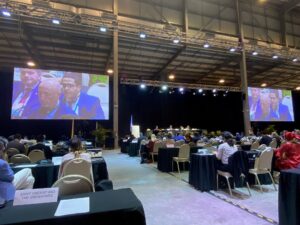Waste management and specifically plastic waste management has gained significant momentum on the global agenda over recent years. Compared to the sparse presence and attention devoted to international convenings on these topics ten or even five years ago, it is striking to note that 2,000+ delegates, including national representatives from 150 UN countries, attended INC-1 in Punta del Este, Uruguay, for one whole week.
In March 2022, the United Nations Environment Assembly agreed to commence negotiations to define a global, legally binding agreement for managing plastic along its entire value chain. These negotiations will be carried out through five Intergovernmental Negotiating Committees (INCs) between 2022 and 2024, before a final document is submitted for signing to UN Member States.
Across the world, plastic generation, consumption and treatment is currently regulated by a patchwork of municipal, national and international policies, which are often ineffective when attempting to address global topics such as marine plastics, which know no boundaries and do not recognize national sovereignty. Similar to other environmental topics such as climate change, plastic pollution also disproportionally affects countries in the Global South, which are already experiencing the material impact of plastics not effectively managed on land.

While the objective of these negotiations and the resulting legally binding agreement is clear (i.e., to end plastic pollution), its ramifications are broad and complex and demonstrate just how much plastic has become an integral part of global consumption models and modern culture. Plastic is everywhere, from the clothes we wear to the packaging we use to make sure imported food can reach our tables safely and at a high quality. Some plastics can be reduced without significantly altering global supply chains and modern ways of life (for example single use items such as drinking straws), while others, such as the polymers that have become prominent in the textile industry, will require significant restructuring of entire sectors of the economy.
While no clear agreements were reached during INC-1 (the first of the five rounds of negotiations), the meeting was instrumental in setting the boundaries and key components of the instrument that will be created between 2022 and the end of 2024. For example, all UN Member States in attendance endorsed the creation of a document that addresses the entire value chain of plastic, including its generation, design, use, treatment and disposal. Funding and capacity building will also need to be included as part of the agreement, particularly to support global south regions in their transition.
At Delterra, we firmly believe that in order to solve the global waste crisis, we need to look at the full value chain for all waste, and not just a specific group of materials, such as plastic. We partner with municipalities, who are responsible for all waste generated within their jurisdiction, to enable a system transformation encompassing behavior change to promote waste separation, new collection routes and treatment infrastructure, the creation of markets for recovered materials, and building that legislation and those partnerships that will enable long-term sustainability. Having said that, the level of global ambition displayed at this first meeting is certainly refreshing and will continue to raise the importance of adequate waste management on the global agenda.
This blog was written and contributed by:
Federico di Penta
Regional Director, Latin America
Delterra

